|
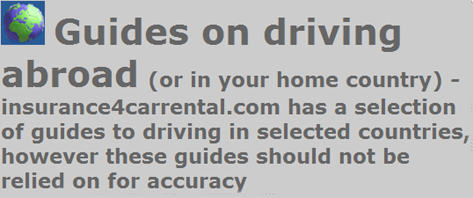 =
=

 Driving in Bulgaria
Driving in Bulgaria
Key
rules, regulations and things to know

Driving:
Drive
on the right and overtake on the
left.
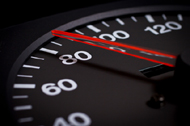 Speed limits:
130
km/h (80 mph) on motorways - 90 km/h (56 mph) on other roads
outside built-up areas - 50 km/h (31 mph) in built-up areas.
The toll roads in Bulgaria are
well surfaced, other roads can be rough, so it is advised that
you drive slower on these to avoid an accident or damage the
vehicle that you are driving.
Speed limits:
130
km/h (80 mph) on motorways - 90 km/h (56 mph) on other roads
outside built-up areas - 50 km/h (31 mph) in built-up areas.
The toll roads in Bulgaria are
well surfaced, other roads can be rough, so it is advised that
you drive slower on these to avoid an accident or damage the
vehicle that you are driving.
Driving
Age: The minimum driving age is 18yrs
Minimum
Driving Ages European Countries - Here Check with
your car rental company about the minimum and maximum age to
hire a car
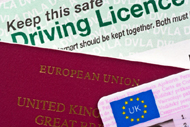 Driving licence:
Citizens of other EU countries and Switzerland are allowed to
drive with their valid national driving licences. Citizens of
non-EU countries may drive in Bulgaria with their valid national
driving licences for one year
Driving licence:
Citizens of other EU countries and Switzerland are allowed to
drive with their valid national driving licences. Citizens of
non-EU countries may drive in Bulgaria with their valid national
driving licences for one year
 Seat
Belts: It is the law to wear a
seat belt including in the back seats if belts are fitted Children
under the age of 12 and/or less than 150cm tall may not travel
in the front seat and must use appropriate restraints.
Seat
Belts: It is the law to wear a
seat belt including in the back seats if belts are fitted Children
under the age of 12 and/or less than 150cm tall may not travel
in the front seat and must use appropriate restraints.
 Driver of motorbikes must wear
safety helmets.
Driver of motorbikes must wear
safety helmets.
 Mobile Phones: Mobile
phones may only be used with a hands free system. Don't
risk using one as you can receive a heavy fine in most countries
and more important cause a serious accident.
Mobile Phones: Mobile
phones may only be used with a hands free system. Don't
risk using one as you can receive a heavy fine in most countries
and more important cause a serious accident.
Road
Signs: Road signs are in the Latin as well as
the Cyrillic alphabet
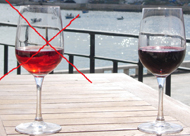 Drink and Driving: The
blood/alcohol limit in Bulgaria is 0.05
alcohol per 100ml blood. More
information Here
Drink and Driving: The
blood/alcohol limit in Bulgaria is 0.05
alcohol per 100ml blood. More
information Here
 Headlights: Dipped headlights are recommended to be used
during daylight hours all year round and they must be used in
the winter months - 1st November - 1st March.
Headlights: Dipped headlights are recommended to be used
during daylight hours all year round and they must be used in
the winter months - 1st November - 1st March.
 Snowchains: Snow chains should
be carried in the car in the winter from 1st November to 31st
March. The road signs will indicate when snow chains are compulsory
or not. The use of snow tyres is not legally required.
Snowchains: Snow chains should
be carried in the car in the winter from 1st November to 31st
March. The road signs will indicate when snow chains are compulsory
or not. The use of snow tyres is not legally required.
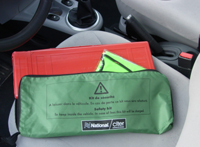 Warning / Emergency Equipment:
All vehicles must carry
a warning triangle, reflective
vest, fire extinguisher
and a first aid kit.
Warning / Emergency Equipment:
All vehicles must carry
a warning triangle, reflective
vest, fire extinguisher
and a first aid kit.
 Parking:
You
must par a vehicle on the left only in a one-way street. Parking
in larger towns is on a pay basis. Restricted
parking
zones are marked as either Blue or Green zones and are paid
for on a Pay and Display principle. In Sofia
the capital, a Blue zone charge fee can be paid to a parking
warden or by sending a text message to 1302. Payment is by the
hour. After sending the text message, the subscriber gets a
confirmation that the payment is successful. Five minutes before
the pre-paid hour elapses, the subscriber receives a notification
that they need to renew their payment.
Parking:
You
must par a vehicle on the left only in a one-way street. Parking
in larger towns is on a pay basis. Restricted
parking
zones are marked as either Blue or Green zones and are paid
for on a Pay and Display principle. In Sofia
the capital, a Blue zone charge fee can be paid to a parking
warden or by sending a text message to 1302. Payment is by the
hour. After sending the text message, the subscriber gets a
confirmation that the payment is successful. Five minutes before
the pre-paid hour elapses, the subscriber receives a notification
that they need to renew their payment.
In
most other towns parking in Green and Blue zones is payable
either at a parking meter or to a parking warden that will be
present on the spot, following the Pay and Display principle.
Unless designated by signs, parking is free of charge in other
areas. In central urban areas in Bulgaria, paid car parks are
common.
 Disabled Parking:
Cars parking in disabled parking spaces must display the blue
disabled parking card. Places for disabled
people are marked with a wheelchair sign.
Disabled Parking:
Cars parking in disabled parking spaces must display the blue
disabled parking card. Places for disabled
people are marked with a wheelchair sign.
Part
Source: Anglo-Info | Economy
Car Hire / zest car rental
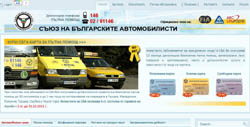 Union des Automobilistes Bulgares (UAB) - To enter the site,
click on the image above left
Union des Automobilistes Bulgares (UAB) - To enter the site,
click on the image above left
Bulgaria
offers a mixture of spectacular mountain ranges and golden beaches
stretching along the Black Sea coastline. There is an array
of beach and ski resorts to keep you entertained, with Bulgaria
been cited as a great value ski destination. The nightlife throughout
Bulgaria is also renowned for being lively.
Bulgaria
offers a fantastic combination of sun, sea, sand and culture.
There are plenty of walks to indulge in and allow you to immerse
yourself in the stunning scenery of this diverse country.
Things
to See and Do
Seek
out some of Bulgaria's festivals which are an important part
of Bulgarian rural life. Bulgaria is rich in the folklore traditions
of folk dances, music, national costumes and traditional rituals.
Hit
the slopes at the major ski resorts of Bansko,
Borovets, or Pamporovo
Enjoy
the mountainous scenery of the Rila Mountains.
Visit the city of Sofia, it is
a modern and lively capital with over 300 bars, restaurants,
discos, and cafes.
Enjoy
sun, sea and sand at one of the Black
Sea coastal resorts which include Sunny
Beach and Golden Sands
Go
on a mountaineering or climbing trip which can be arranged in
the areas of Vratsa, Veliko Tarnovo, Trojan,
Maliovitza and Roussenski Lom.
There are plenty of caves and rock formations and ancient cave
paintings to explore.
Go
horse riding in the Danube Valley,
the Balkan, Rila and Stara
Planina Mountains and the Valley
of Roses. Try Mountain biking in the Rhodopi
Mountains, there are some good trails and scenery here.
Visit
the ancient Bailusheva pine forests,
limestone rocks in Pirin National Park,
the seven lakes and the 10th century monastery in Rila
National Park.
Source: Economy
Car Hire / zest car rental
Back
to top
 FACT FILE
— Bulgaria
FACT FILE
— Bulgaria
Bulgaria
is situated in south-eastern Europe, in the north-eastern part
of the Balkan Peninsula. It has a territory of 110 911 square
kilometres which is 22% of the Balkan Peninsula. Its length
is 520 km and its width is 330 km. The overall length of its
borders is 2245 km. Bulgaria borders to the north on Rumania
(the frontier line runs along the Danube river and continues
on land to the north-east), to the south — on Greece and Turkey,
to the west — on Serbia and Macedonia (former Yugoslavia) and
to the east — on the Black Sea.
The
Official Name is Republic of Bulgaria and the Capital City is
Sofia.
Other
major towns and cities include Stara Zagora, Varna, Rusie, Kurdzhali,
Blagoevgrad, Pleven and Burgas.
There
are 9 provinces (oblasti, singular—oblast); Burgas, Grad Sofia,
Khaskovo, Lovech, Montana, Plovdiv, Ruse, Sofia, Varna
Bulgaria
became a member of the EU on the 1st January 2007
The
Climate:
Summers on the Black Sea coast are hot, inland warm summers
and cold winters (with snow) are commonplace. The climate in
Northern Bulgaria is moderate continental, while the climate
in Southern Bulgaria is intermediate continental tending to
Mediterranean.
Marked
by four distinct seasons,
Bulgaria enjoys a generally favourable climate that is one of
the country's best features. Although located at the same latitude
as southern New England, Bulgaria's
climate is noticeably more temperate. Summers
are typically hot and dry, but rarely oppressive, with moderate
relative humidity. Winters are
cold but not bitterly so. In the south and Black Sea coastal
regions, Mediterranean influences temper the harsher continental
climate of the interior.
The
country's mountains climate effects also help in determining
regional variations of weather.In the capital, Sofia, daytime
high temperatures average 82°F/28°C in July-August; 37°F/3°C
in January, and reflect the ameliorating effects of nearby Mt.
Vitosha. The wettest months are April-May and November in the
interior; June, October and December along the coast. In mid-summer,
the coast enjoys prodigious sunshine.
Religions:
Bulgarian Orthodox, Muslim, other.
Population:
8,155,000
Currency:
The unit of currency in Bulgaria is the lev w hich is
made up of 100 stotinki.
Currency Conversion Here
Electricity:
The voltage is 230 Volts with standard European 2 pin plugs.
Telephone
Country Code: + 359

Landforms:
The Balkan Mountains run through
the central part of the country, the Rhodope Mountains through
the southwestern part (near the border with Greece), with fertile
lowlands covering the north and southeast. The Danube River
forms the northern border with Romania
Sea
resorts
Albena
The major resort north of Varna, Albena occupies a pretty stretch
of coast just north of Varna and south of Cape Kavarna.
Sunny
Beach: Sunny Beach is a resort
center, which is situated in the southern part of the Bulgarian
seaside, 6 km north of Nessebar and 42 km north-east of Bourgas.
It is located in the close proximity of the arched Nessebar
bay.
Golden
Sands: Golden Sands Resort is situated
in the north part of the Black Sea, 17 km from Varna.
Nessebar:
Nessebar — the pearl of the South coast of the Black Sea, is
one of the most ancient towns in Europe. The town, founded 3000
years ago by the Thracians by the name of Messemvria, is situated
at a little rocky peninsula.
Sozopol
Situated 34 kilometers south of
Bourgas upon a small peninsula, Sozopol is the oldest town at
the Bulgarian seaside. Founded in the year 610 B.C. by the Greeks.
Sveti
Konstantin: Sveti Konstantin Resort
is situated in the North part of the Bulgarian seaside , 8 km
from the town of Varna.
Ski
resorts
Bansko
The town of Bansko is situated at the Glazne river at the northeastern
bottom of the Pirin Mountains, 160 km south of Sofia, 60 km
southeast of Blagoevgrad. Bansko is one of the biggest mountain
resorts in Bulgaria with a long winter to take advantage of
its modern, well developed skiing and sport facilities.
Pamporovo:
Pamporovo, the second major Bulgarian mountain resort, is located
1650 m above sea level in the Western Rhodopes, 16km from Smolyan,
among evergreen spruce forests, picturesque meadows, strange
rock formations and beautiful mountain peaks. Due to the Mediterranean
influence the climate is mild with bracing air and the good
snow-cover provides excellent skiing conditions from mid-December
to mid-April.
Borotets:
The oldest Bulgarian resort, Borovets, is hidden among the aromatic
pine woods covering the northern slopes of Mount Musala in Rila
mountains, 12 km south of Samokov and 72 km of Sofia.
Vitosha:
A wooded mass of granite 19km long by 17 km wide, Mount Vitosha,
whose foothills begin some 7 km from the centre of the Bulgarian
capital, is very much a part of the city and is the source of
its pure water and fresh breezes. Vitosha is the cradle of hiking
tourism in Bulgaria and every year thousands of hikers climb
its highest peak.
Spa
resorts
Bankya:
Bankya is a world-wide known health resort. It is situated in
the beautiful valley at the green foothills of the Lyulin mountain,
17 km far from Sofia, at an altitude of 630-640 m.
Devin: Devin is a renowned spa
and holiday resort. It is situated amid scenic hills in the
heart of the Rhodopes at an altitude of 710 — 780 m.
Hissarya:
The well-known spa of Augusta (the
ancient name of Hissarya) is situated in the centre of Bulgaria,
in the southern folds of the Sredna Gora Mountain, 42 km north
of Plovdiv (the second biggest town in the country) and 160
km east of Sofia (the capital). It is close to the famous Valley
of Roses.
Pavel
Banya: Situated on the right bank
of the Tundja river, Pavel Banya is an unquestionable leader
in the top chart of the Bulgarian resorts.
Sandanski: Situated at an altitude
of 224 m in the valley of the Sandanska Bistritsa River,
at the foot of the magnificent south-western slopes of the Pirin
Mountain, the town of Sandanski is famous for the beauty of
its scenery and a wealth of resources for spa and climatic treatment.
This is the warmest and sunniest town in Bulgaria with the least
temperature variations throughout the year.
Varna
is Bulgaria's third largest city with a population of 370,000.
It is the main port for both naval and commercial shipping and
the city that is beside the beach has a pleasant atmosphere
with many pedestrianised areas. It is on the same latitude as
Nice, Monaco and Cannes.
Connections are now improved from the UK with British Airways
having an all year round service. There are new golf courses
being built and a €25million grant has been awarded by the EU
for the development of a marina.
Source
jmlvillas.com -
(some of this information has been provided by jmlvillas.com
clients)
Back
to top
 Emergency
Telephone number: pan-EU Emergency
112 Can be used in all EU Countries and
it can be dialled from a locked mobile or a mobile with
no sim card. We have driving guides for those countries
marked in red below (plus
other non EU member European countries). Emergency
Telephone number: pan-EU Emergency
112 Can be used in all EU Countries and
it can be dialled from a locked mobile or a mobile with
no sim card. We have driving guides for those countries
marked in red below (plus
other non EU member European countries).
Austria
-
Belgium
-
Bulgaria - Cyprus
- Czech
Republic - Denmark
- Estonia - Finland
- France
- Germany
-
Greece - Hungary
- Ireland
- Italy
- Latvia - Lithuania - Luxembourg
- Malta-
Netherlands
- Poland
- Portugal
- Romania - Slovakia - Slovenia
- Spain
- Sweden
 Drink Drive Laws - Examples of what can be drunk at
present
Drink Drive Laws - Examples of what can be drunk at
present
It
is not a lot and in some countries even to drink the
glass on the right would be breaking the law if you
drove afterwards in others a sip would be too much see
"Wine"
below
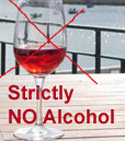 "Wine
- even a sip will send you
over the limit and invalidate your insurance in Parkistan,
Cuba, Indonesia, Romania, Jordan and Nigeria, according
to Rhinocarhire.com which produces a comprehensive guide."
The
A to Z of car hire - The Independent - August 2010
"Wine
- even a sip will send you
over the limit and invalidate your insurance in Parkistan,
Cuba, Indonesia, Romania, Jordan and Nigeria, according
to Rhinocarhire.com which produces a comprehensive guide."
The
A to Z of car hire - The Independent - August 2010
See
this guide for further information
Back
to top
Emergency
Telephone Numbers in Europe:
Emergency
Telephone number: pan-EU Emergency 112 Can be used
in all EU Countries and it can be dialled from a
locked mobile or a mobile with no sim card.
Driving
abroad - British Government website.
Contains general information
about driving abroad and gives you the option to search
for specific advice by country
Finally,
Don’t forget your excess cover and buy it before you
set off
Excess
charges could cost you up to £1,000 or more. Protect
yourself by organising your
insurance4carrental
car hire insurance before
you head to Europe.
Back
to top

Other
Country Information Guides
|